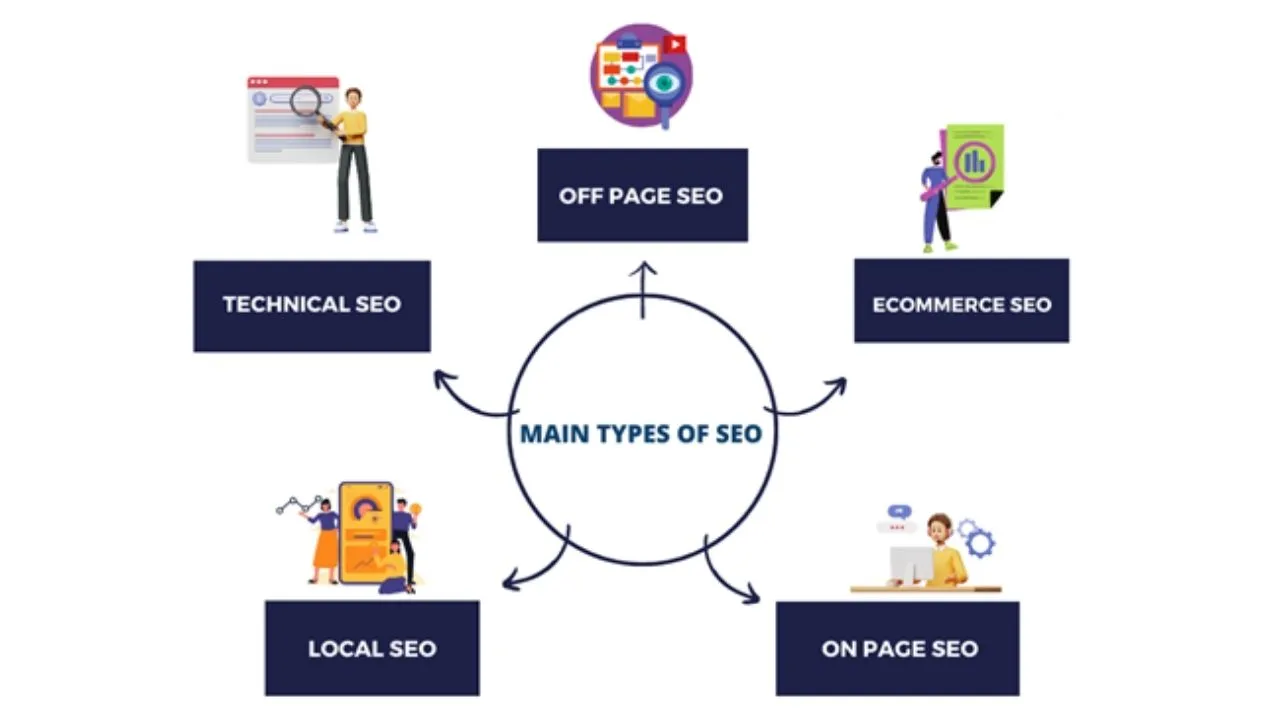
Table of Contents
Search Engine Optimization (SEO) is a multifaceted discipline aimed at improving a website’s visibility on search engines. SEO can be divided into various types, each focusing on different aspects of optimization.
Understanding the different types of SEO is crucial for developing a comprehensive strategy that enhances your online presence and drives organic traffic. In this article, we will explore the main types of SEO, their unique characteristics, and how they contribute to a successful SEO strategy.
1. On-Page SEO
On-page SEO involves optimizing individual web pages to rank higher and earn more relevant traffic from search engines. This type of SEO focuses on both the content and HTML source code of a page.
Key Elements of On-Page SEO:
- Keyword Research and Optimization: Identifying relevant keywords and incorporating them into your content, meta tags, and URLs.
- Content Quality: Creating high-quality, valuable, and engaging content that meets user intent.
- Meta Tags: Optimizing meta titles and descriptions to improve click-through rates.
- Header Tags: Using header tags (H1, H2, H3) to structure content and make it easier for search engines to understand.
- Internal Linking: Adding links to other relevant pages on your website to enhance navigation and improve link equity.
2. Off-Page SEO
Off-page SEO refers to actions taken outside of your website to improve its ranking. This primarily involves building backlinks from other reputable websites.
Key Elements of Off-Page SEO:
- Link Building: Acquiring high-quality backlinks from authoritative sites to improve your site’s credibility and authority.
- Social Media Marketing: Promoting your content on social media platforms to increase visibility and attract links.
- Guest Blogging: Writing articles for other websites to gain exposure and backlinks.
- Influencer Outreach: Collaborating with influencers in your industry to promote your content and attract links.
3. Technical SEO
Technical SEO involves optimizing the technical aspects of your website to ensure that search engines can crawl and index it effectively. It focuses on improving the site’s structure, speed, and performance.
Key Elements of Technical SEO:
- Site Speed: Enhancing the loading speed of your website to improve user experience and search rankings.
- Mobile-Friendliness: Ensuring your website is responsive and performs well on mobile devices.
- XML Sitemaps: Creating and submitting XML sitemaps to help search engines understand your site structure and index your pages.
- Robots.txt: Using robots.txt files to control how search engines crawl your site.
- Secure Sockets Layer (SSL): Implementing SSL certificates to ensure your site is secure (HTTPS), which is a ranking factor for search engines.
4. Local SEO
Local SEO focuses on optimizing your website to rank better for a local audience. This is particularly important for businesses that serve specific geographical areas.
Key Elements of Local SEO:
- Google My Business (GMB): Creating and optimizing your GMB profile to appear in local search results and Google Maps.
- NAP Consistency: Ensuring your business’s Name, Address, and Phone number (NAP) are consistent across all online directories.
- Local Citations: Getting your business listed in local directories and review sites to improve visibility and credibility.
- Local Keywords: Incorporating local keywords into your content and meta tags to target local search queries.
- Customer Reviews: Encouraging satisfied customers to leave positive reviews on your GMB profile and other review sites.
5. E-commerce SEO
E-commerce SEO focuses on optimizing online stores to increase their visibility in search engine results, attract more traffic, and drive sales.
Key Elements of E-commerce SEO:
- Product Page Optimization: Optimizing product titles, descriptions, images, and meta tags to improve search rankings.
- Category Page Optimization: Enhancing category pages with relevant keywords and content to attract organic traffic.
- User Reviews: Encouraging customer reviews to build trust and improve search rankings.
- Site Structure: Creating a clear and logical site structure to improve navigation and crawlability.
- Schema Markup: Using schema markup to help search engines understand your product details and display rich snippets.
Conclusion
SEO is a complex and ever-evolving field with various types that cater to different aspects of website optimization. By understanding and implementing the different types of SEO, you can develop a comprehensive strategy that enhances your online visibility, drives organic traffic, and achieves your business goals.
Whether it’s on-page, off-page, technical, local, or e-commerce SEO, each type plays a crucial role in your overall SEO success.
Elevate Your SEO Strategy Today!
Ready to optimize your website with a comprehensive SEO strategy? At Softhat IT Solutions, we specialize in all types of SEO to help you achieve top search engine rankings and drive targeted traffic.
Contact us now to schedule a consultation and learn how we can boost your online presence.
